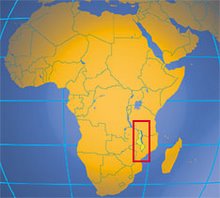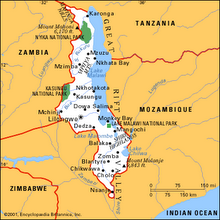I have successfully completed my first full week of work and the first days have been really exciting! To give some context, I’ll start by describing a bit about my partner organization which is WaterAid Malawi. WaterAid is an international non governmental organization (NGO) working on creating improved health outcomes for people living in poverty through the provision of safe domestic water, sanitation and hygiene education. Based out of the UK, but working through country offices, WaterAid works with and through other local and community-based organizations and government departments in a capacity building, technical support and monitoring and evaluating role, helping them to design and implement various water, sanitation and hygiene programs that are appropriate for specific areas. This usually involves setting up low cost, sustainable projects using appropriate technology that can be managed by the community itself. They also work on a higher level seeking to influence the policies of the district and national level governments, to secure and protect the right of poor people to safe, affordable water and sanitation services.
Engineers Without Borders (EWB) has partnered with WaterAid in several other countries including Zambia and Burkina Faso. There are currently two volunteers with WaterAid Zambia and it is great to have them so close by so we can compare notes and help each other out. My role with WaterAid Malawi is as a Technical Support Officer. In that capacity, I will be undertaking several tasks and assisting with several of their projects. The first is a project to be undertaken in Machinga District that includes the rehabilitation of two gravity-fed water schemes. Malawi has over 80 gravity fed schemes in the country but many of them have fallen into disrepair. This particular project includes working with their local partner organization, responsible for the project implementation, and the local government, responsible for project planning and monitoring, to rehabilitate the two schemes, and where required, provide some technical support, assist in the development of a water quality monitoring program and the training of the community management committees. Other projects include further water quality monitoring in Salima District as well as conducting some research on the feasibility of rope pumps that have been used as an alternative technology to handpumps. They represent a lower cost alternative to the handpumps but further investigation is required to ensure they are maintained by the community and are providing water of adequate quality.
Over the past week and a half I have been lucky to get out in the field a few times. Last week I visited some peri-urban areas on the outskirts of Lilongwe. WaterAid is working with the Lilongwe Water Board to set up water kiosks, communal areas where people can go to purchase treated water, in low income urban settlements. It was quite an experience in many ways. It was difficult to see the conditions in which many of these people are living. Many of them get their water from open shallow dug wells. I looked down one of them and it was awful...garbage floating in it, a scum on the top and very murky. There's also several pools of standing water around where people dump their used water because there's no sanitary system. These areas attract mosquitoes and, therefore, malaria. In many cases, there is a tap quite nearby but many have been disconnected as the money that was being collected was not being remitted to the Water Board. The Water Board, with assistance from WaterAid, is working to liase with the community groups to ensure that adequate water is being provided and the kiosks are being properly managed such that the Board is being fairly compensated for the service it provides.
Earlier this week I went down to Machinga for several days to take part in a Water User’s Day in a village called Chilimani within one of the gravity-fed schemes. Geographically, Machinga is located very close to Zomba in the southern part of Malawi (check out the map of Malawi on the side and if your eyes are good, you should be able to pick out Zomba!). With members of the local implementing NGO, as well as extension agents from various district level ministries, we were up bright and early (we were at the tap at 5AM!) to collect data on the household water users at the tap and through various household surveys, to determine how much water is being used, what are their water handling and sanitation practices, what are the hygiene practices, and trying to assess if any groups are being excluded at all from access to the water point for economic or social reasons. We also collected several water samples for water quality testing and conducted a meeting with the tap committee to understand some of their concerns including the collection of user fees and areas for system extensions. It was great to be in the village again! It reminds me a lot of Uganda in many ways. It was also good to become a little more familiar with the project and to meet some of the people and start to identify ways in which I think I’ll be able to contribute. Below are a few pictures from my two days in Chilimani.
I hope all is well with everyone back home. Keep the emails coming as I can’t get enough of them!
Hugs, Heather
Saturday, August 25, 2007
Subscribe to:
Post Comments (Atom)



4 comments:
Hey Heather:
I am now officially stalking you - have found your blog and am really enjoying living vicariously through you. Now if you can just get that Mary Tyler Moore apartment ....
Miss you here in Ottawa!
xox
Barb
Your blog keeps getting better and better! Your older articles are not as good as newer ones you have a lot more creativity and originality now keep it up!
Nice brief and this fill someone in on helped me alot in my college assignement. Thank you for your information.
A lot of charitable work is going on in Malawi. Land in by flights to Lilongwe and volunteer in the works being conducted here if you wish to or just indulge in the holiday mania as desired.
Post a Comment